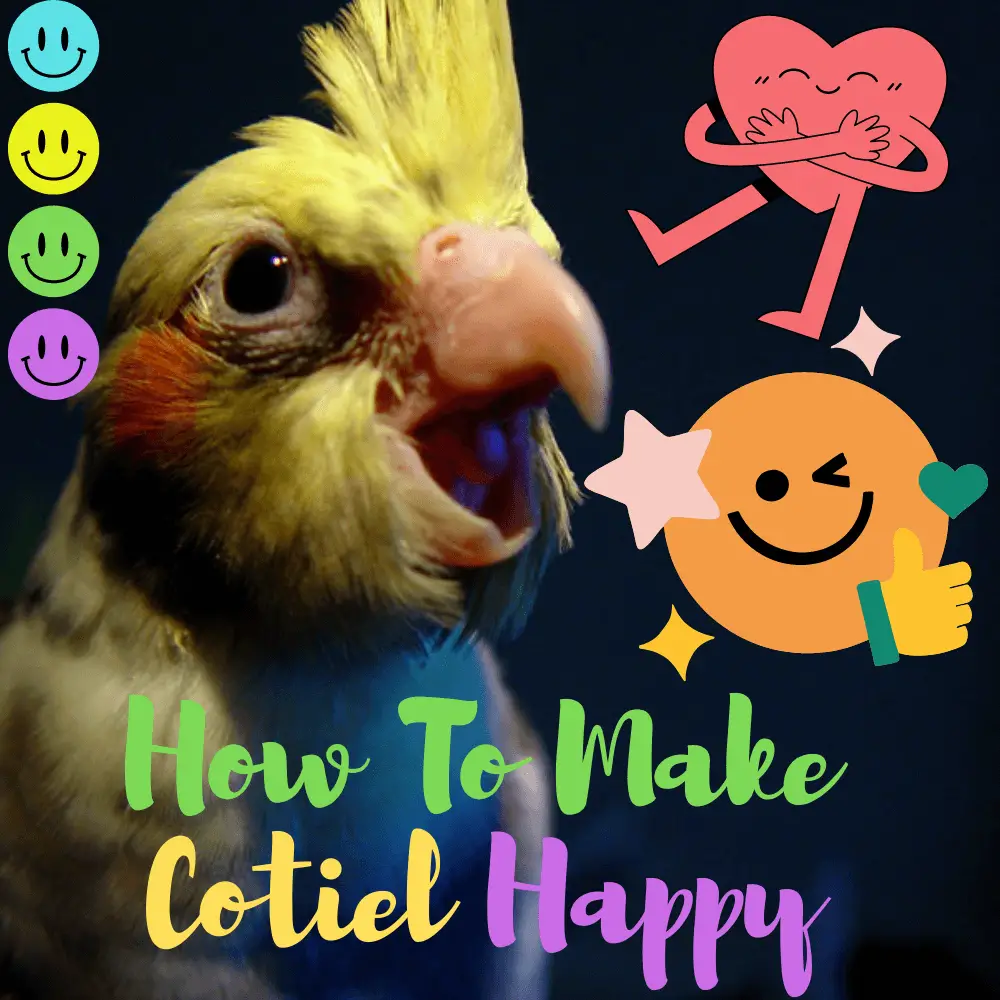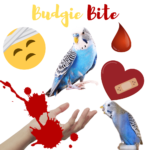
How to make cockatiel happy: The cockatiel parakeet is native to Australia. This is a fairly common pet and can make a great companion. They should always be raised in groups or at least in pairs. Here are some tips to keep your feathered boyfriend happy and healthy.
Preparing the cockatiel home
All you need to know about preparing the cockatiel home
Find a cage of the right size
Make sure you have a cage of the right size for your cockatiel. It should be large enough for your bird to spread its wings, even if there are other birds or elements in the cage. Remember that your cockatiel will have to spend more time outside his cage than inside and take 90 cm x 50 cm x 100 cm minimum for two or three.
- Opt for a cage that is easy to clean. Remember that a bird will relieve itself every ten to fifteen minutes.
- Check if you can easily insert your hand into the cage.
- Your cockatiel will need enough space to spread its wings.
Install perches
Make sure you put enough perches in the cage so that your cockatiel can move and jump freely inside. A cockatiel should also be able to fly between perches if they are laid correctly. Perches made of natural wood and rope are ideal.
- Do not perch directly above each other, as a cockatiel cannot fly vertically.
- Try creating ladders or platforms using perches to manage a vertical position.
- Avoid concrete perches, as they are too hard for the cockatiel legs.
- Check that the wood, such as the eucalyptus, is suitable for the bird.
- Plywood or plastic perches can create problems with the legs because they don’t give them enough exercise.
- Avoid perches and toys made from prunus or oak, as they can harm your cockatiel.
Put toys in the cage
Variety matters. Parakeets, like most birds that are part of the parrot family, love to demolish objects. Toys made from natural foliage and shredding are essential to allow the cockatiel to properly file its beak.
- Variety is also important. Your cockatiel will be happier if she has lots of toys to play with.
- Ask a veterinarian for advice before adding natural foliage, as not all trees and shrubs are suitable for a cockatiel.
- A cockatiel will eventually get tired of its toys. Swap and clean them every two weeks.
Offer bathing solutions
All birds will need a bathing solution at their disposal. In addition to keeping the bird clean, water also provides physical and mental stimulation. Most pet stores offer sturdy plastic bathtubs for cockatiel cages.
- Some birds may prefer spraying from a fogger or even taking a shower with their owner.
- You can gently spray your bird with water at room temperature. Do this over the bird and do not spray directly on it.
- Parakeets are birds adapted to desert lands. They do not need to bathe more than once a week.
- Change the water daily to avoid bacterial contamination.
Caring for a cockatiel
Feed your cockatiel properly
There are all kinds of granulated formulas, designed by veterinarians and are supposed to provide a nutritious and balanced diet. In addition to these commercial preparations, your cockatiel can also enjoy all kinds of fruits and vegetables.
- Try offering him corn, grapes, millet, or sunflower seeds as treats.
- Try using pellets and vegetables to reduce the bird’s seed intake to a minimum (preferably 33% or less).
- A diet consisting mainly or mainly of seeds is very rich in fat and will reduce the life expectancy of a cockatiel.
- Never give the cockatiel chocolate, caffeine, or alcohol. These are highly toxic products for the bird.
Monitor your bird’s health
It can often be quite difficult to know if your bird is not well. Go to a veterinarian if you see anything out of the ordinary in your bird. Observe the following symptoms:
- sudden weight loss
- abnormal breathing
- discharge from the spout
- mucus on feathers
- abnormal behavior
- have the bird examined by a veterinarian twice a year
- Immediately isolate the diseased cockatiel, if you have several
Give your cockatiel enough sleep
Parakeets need to sleep between ten and twelve hours a night. They should be in a quiet, dark place to get enough sleep each night.
- These ten to twelve hours of sleep are in addition to the naps she can take during the day.
- You may need a separate cage to sleep in if the cage environment during the day is not quiet enough at night for at least ten to twelve hours.
- Cover three sides of the cage with a blanket to isolate it from light and noise.
- Remember to leave one side open to promote oxygen circulation.
- Parakeets often tend to suffer from “night terrors”. Place a small light near the bird’s cage to reduce tension.
Watch the length of the beak and claws
A beak and claws that are too long can cause health problems. In the wild, your bird will know how to keep its beak and claws of the right length.
- Long claws can get tangled or caught in toys or on the bars of the cage, which will hurt the bird.
- Problems perching can be the result of claws being too long, which in turn can injure the paws.
- Claws that are too long are also sharpened. A bird that perches on your hand can be uncomfortable or hurt you.
- Use a grooming bar to allow the bird to file its claws as it moves in its cage. Try to put it near the bird’s food and water to make sure it is using it. These grooming poles can be found in most pet stores.
- Make sure the bird has enough toys to play with in order to keep its beak the right length. Playing using his beak will help him wear it out and keep it at a good length. Lava pebbles and cuttlefish bones are excellent elements to offer your cockatiel to maintain his beak.
Keeping the cockatiel in shape
Encourage physical activity
A cockatiel needs to stretch its legs regularly. It should be able to flutter, as long as it is healthy, even if you have clipped its wings. Walking or flying around a room will keep your bird happy and fit.
- Ensure the safety of the bird. Close windows and doors, turn off fans and take out cats or other pets.
- Try to challenge the cockatiel when she is outside the cage by dropping treats in different places, which requires her to walk or fly to reach them.
- Think about hygiene. Your bird will probably relieve itself anywhere, so you should keep it away from a worktop in the kitchen or furniture.
Pet your bird
This is a great way to interact with the cockatiel and get attached to it. Try to gently stroke the bird’s head and neck when it is out of its cage.
- Certaines perruches accepteront mieux vos caresses que d’autres.
- Un oiseau qui incline la tête vous invite à le gratouiller.
- N’oubliez pas de vous laver les mains avant et après avoir touché votre oiseau.
- N’insistez pas si la perruche ne veut pas être touchée.
- Faites preuve de douceur. On peut blesser facilement un oiseau.
Échangez avec votre oiseau
Les perruches sont des créatures intelligentes et ont besoin d’une stimulation mentale. Le fait de lui offrir des stimulations et des échanges est un excellent moyen de garder votre oiseau heureux et de renforcer vos liens avec lui. Vous pouvez aussi lui apprendre les astuces suivantes.
- Parlez souvent à votre oiseau, vous pouvez même lui faire de la lecture.
- Commencez par des ordres tels que « Monte ! » et « Saute ! » qui coïncident avec ses allées et venues sur votre doigt.
- La répétition est essentielle pour encourager l’oiseau à faire ce que vous lui demandez sous forme de mots.
- Mettez de la musique ou laissez la radio allumée si vous ne pouvez pas échanger avec votre oiseau. La perruche finira même par imiter la chanson ou des propos qu’elle entend.
- Posez la perruche sur une balle de tennis et aidez-la à apprendre l’équilibre. L’oiseau finira par monter sur la balle de lui-même.
- Ne frappez jamais ni ne hurlez après une perruche.
- Concentrez-vous toujours sur des encouragements quand vous exercez votre oiseau.
Essayez de jouer avec votre perruche
Cela peut être un excellent moyen de stimuler l’oiseau et lui apprendre de nouvelles choses. Cela peut aussi lui permettre de s’attacher à vous. Essayez quelques-uns des jeux suivants avec votre perruche.
- Essayez de danser avec la perruche. Bougez la tête de haut en bas ou d’un côté à l’autre et au tempo d’une chanson. Les perruches ont le sens du rythme et vont souvent bouger la tête avec vous et au diapason de la musique.
- Jouez d’un instrument de musique pour votre perruche. Jouer de la musique, siffler ou chanter peut être très divertissant pour votre oiseau. Il peut même apprendre à chanter un air pour vous, s’il l’a entendu à de nombreuses reprises.
- Jouez à cachecache avec votre oiseau. Mettez la perruche dans une pièce et posez-la doucement au sol. Mettez-vous au coin d’une autre pièce et appelez votre oiseau. Faites apparaitre votre tête au coin de la pièce afin que l’oiseau puisse vous voir et dites « cherche-moi ! » avant de vous tapir à nouveau dans le coin. Gratouillez la tête de l’oiseau et félicitez-le quand il vous a trouvé.
Consider taking a second cockatiel
Parakeets are sociable birds that love company. You may want to introduce another bird to your cockatiel as a companion if you are often away.
- Get a second cage for your new cockatiel.
- Keep the two cages separate for three months and check the health of the new bird. You wouldn’t want both cockatiels to get sick.
- You can bring the two cages closer together if the new cockatiel seems to be healthy after three months.
- You should first take each bird out at a different time when they are allowed to leave their cage.
- You’ll end up letting them both out at the same time. Keep an eye on both cockatiels, as they can react aggressively to each other. Any spitting, screaming, nibbling, or attack should be followed by immediate aging.
- They may end up attaching themselves or even visiting each other in their respective cages.
- Never force any exchanges or force your birds to share a cage.
Warnings
- Birds have sensitive lungs that can deteriorate easily.
- Pay attention to smoke fumes in the bird’s immediate environment.
- Teflon from an overheated pan is a significant danger.
- Caustic cleaning products, cigarette smoke as well as heady perfumes can harm your cockatiel.
How to Make Your Cockatiel Happy: Bird Care & Training
SOURCE:eHow




















